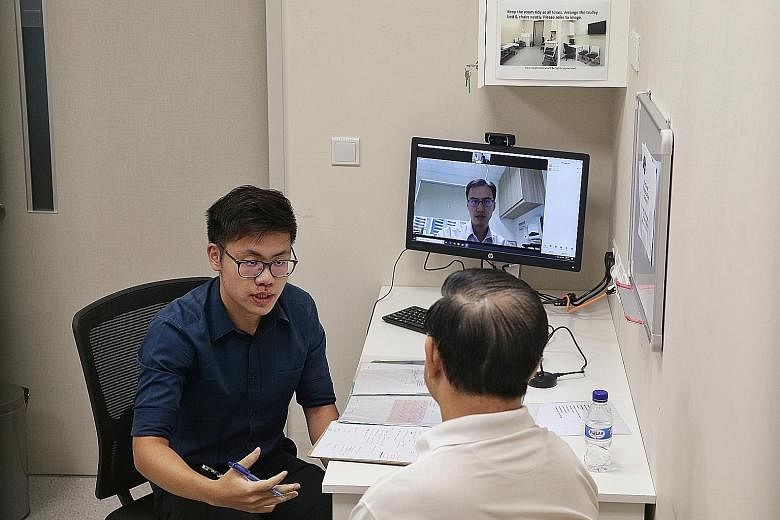Medical students at Nanyang Technological University are using a simulator as part of their clinical training, after postings to hospitals were suspended last month owing to the Covid-19 outbreak.
Called SimConsult, it allows 90 fifth-year students at the university's Lee Kong Chian School of Medicine to learn from various predetermined clinical scenarios.
Simulation essentially involves a student who will diagnose a patient, who is paid to simulate an illness. The session takes place in a room at the school and is observed by a family physician at a polyclinic via Zoom, a video-conferencing platform.
Medical officers script common cases treated in polyclinics, such as patients with diabetes and high blood pressure. To ensure authenticity, the school runs through what needs to be done with the simulated patient before the start of a session.
The medical school's assistant dean of family medicine, Associate Professor Tang Wern Ee, said SimConsult's value lies in the feedback students can get from the simulated patient and the family physician at the end of the "consultation".
With clinical postings, it may be more difficult to extract specific and constructive feedback from real patients, Prof Tang added.
Medical undergraduate Stanley Low agrees. Said the 24-year-old: "The physician would highlight areas for improvement and focus on the finer details of the case, like management decisions - probing my prescription decisions and discussing the considerations of prescribing such medications."
He added that the feedback he receives from the patient and the physician is "a good synthesis of what I have been learning from the past few years".
Still, SimConsult falls short of actual experience from a clinical posting, because the patients are not real.
For example, heart murmurs are impossible to replicate, regardless of how skilled the simulated patient is in acting.
Also, the simulator is not a less expensive alternative after taking into account the cost of the simulated patients' services and the video-conferencing platform, among other things.
For undergraduate Shafiqah Shahrin, the main difference is that in a clinical posting, she has to be more independent in dealing with patients.
"Simulated sessions are within a controlled setting, with the agenda made known to us. In clinical settings, we have to be more independent as there won't be any seniors to oversee us," said the 24-year-old. But SimConsult is "a very good compromise", she added.

